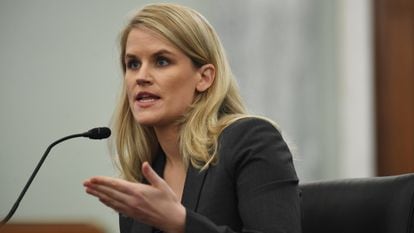/cloudfront-eu-central-1.images.arcpublishing.com/prisa/OMVO3CA675FMXJVWWWEB55CS6M.jpg?ssl=1)
Social networks are experiencing a colossal cliff in the US. Their company product has been singled out by a tsunami of lawsuits from individuals, educational institutions and public prosecutors. They accuse the platforms of consciously damaging the psychological overall health of youthful persons. And not just because of the articles they support disseminate: the extremely design and style of the solution, the claimants argue, seeks habit in order to ensnare the user. The much more time men and women shell out hooked to the display, the larger the financial gains from advertising. This vicious circle, the lawsuits argue, is owning awful consequences on young children and young people, who suffer from melancholy, ingesting disorders or even suicidal tendencies.
A 16-calendar year-aged Utah female will become so obsessed with her entire body image just after obtaining hooked on Instagram that she develops anorexia and bulimia. A nine-12 months-outdated Michigan boy spends so lots of evenings observing YouTube, TikTok and Snapchat videos that he finishes up uploading a nude photograph of himself that goes viral. An 11-calendar year-outdated Connecticut female promotions for two a long time with an extreme habit to Instagram and Snapchat just before spiraling into sleeplessness and depression that prospects her to choose her possess life. These harrowing instances, described past year by Bloomberg, are amongst hundreds of non-public lawsuits submitted towards social networks in modern months.
Two hundred of them have joined jointly in a class-action lawsuit. Filed in the Northern District of California in March, the lawsuit expenses that Meta (for Facebook and Instagram), Snap (for Snapchat), ByteDance (the company that owns TikTok) and Google (for YouTube) are significantly harming the mental health of young People in america. The procedure is presently in the pleadings section. The U.S. Supreme Courtroom is due to make your mind up in June whether the lawsuit goes forward or is dismissed.
This newspaper has contacted the four technological innovation firms to inquire about their situation on the course of action. All of them have declined to remark precisely on the lawsuit, over and above assuring that they are taking methods to bolster articles command. “We have made extra than 30 equipment to assist teenagers and their people, like characteristics that permit moms and dads to determine when and for how very long their children can use Instagram,” notes, for example, Antigone Davis, global director of Meta Protection. The firm led by Mark Zuckerberg has just attained an out-of-courtroom settlement to compensate buyers of Facebook whose knowledge was leaked to Cambridge Analytica with 725 million bucks.
“Our situation does not just look at the information of the platforms, the problem is further than that. We allude to the really design of the social networks: from the age verification methods, or the lack of them, to diverse attributes of the platform by itself that, we argue, ended up specifically built to be addictive,” Joseph VanZandt, of the Beasley Allen agency, clarifies to EL PAÍS by videoconference. VanZandt leads the authorized counsel coordinating the course action lawsuit, which entails two other legislation companies and numerous private attorneys.

“Everything from the way videos and posts are exhibited and organized, to the style and placement of buttons, is developed to foster addiction and retain customers coming back to the platform once more and again,” VanZandt argues. “In addition to the style of social networks themselves, the need impacts how the platforms’ algorithms do the job. They are developed to give more traction to written content that raises interactions and engagement on the platform. All with the purpose of escalating marketing revenue,” he stresses. “To examination this, we are performing with a wide network of professionals who argue how these springs operate, as nicely as the impact they have on young persons. We are self-confident in our means to be able to prove that our consumers are currently being harmed by these items.”
A tsunami of lawsuits
The first scenario approved by VanZadt’s staff was that of Brianna Murden, a 21-year-aged who began working with social networks at the age of 10. “After yrs of publicity to content from numerous platforms selected by algorithms, subjected to a torrent of notifications 24 hrs a day, [the networks] have induced her despair, sleeplessness and eating disorders, amid other folks.” In August previous calendar year, they submitted a lawsuit from Meta and other platforms. A several months later, they experienced dozens of comparable petitions. The identical issue happened in other offices. The torrent of lawsuits soon became a tsunami. For this reason, they resolved to file a class motion lawsuit.
California’s is not the only lawsuit filed in opposition to social networks over this situation. In January of this 12 months, Seattle General public Educational facilities sued TikTok, Facebook, Instagram, YouTube and Snapchat, pointing to them as responsible for ruining the psychological health and fitness of teenagers. It was the initially time a general public institution took legal motion towards social networks. Right after the Seattle college establishment arrived people of New Jersey, Florida or Pennsylvania. Very similar proceedings have also been initiated by the attorneys normal of Indiana or Arkansas, amongst other folks. “At this price, it would seem that social networks will encounter lawsuits in each and every condition in the state,” reported Jim Steyer, president of Common Feeling Media, a well-acknowledged NGO that evaluates the affect of technology and media on children.
The short from the Seattle schools, which stand for more than 100 colleges with some 50,000 pupils, argues that the algorithms of these platforms are displaying younger Americans probably destructive material and resulting in unsafe emotional impacts. It is also reported that victims of social networks with “severe addiction” can be affected by “mental and physical problems.” The lawsuit statements that schools are not able to appropriately educate young children for the reason that of social media addiction and relevant repercussions.

“We want these companies to be held accountable for their actions and the destruction they are creating. Not only to the pupils, but also to Seattle Community Colleges, which has to bear the operational stress and raising prices attributable to this mental wellbeing disaster,” Greg C. Narver, head of the legal section of the educational establishment, tells this newspaper. Those expenses contain employing psychologists, specific schooling for school, updating textbooks, and restitution of house harmed by “emotionally disturbed” pupils.
“We are unable to give a concrete determine of how a lot of students at present have mental issues. Nonetheless, we have skilled a sharp maximize in requests from colleges and college students for psychological health-related companies,” Narver provides.
The elephant in the home of social media
Numerous reports attest to the worsening psychological health of young Us citizens. A modern report by the country’s countrywide community wellbeing company certifies that “the psychological health and fitness of pupils proceeds to worsen”, and that numerous “feel so undesirable or hopeless that they can not carry out their every day activities normally”. The class action lawsuit and these filed by academic establishments cite dozens of scientific articles or blog posts that accredit the partnership in between the intense use of social networks and specified mental complications: from stress, melancholy, sleeplessness, having conditions or cyberbullying to self-harm and suicide. A United kingdom court docket dominated last calendar year for the to start with time that social networks were powering a youthful female having her very own daily life. The Condition of Utah, governed by Republican Spencer Cox, has made a decision to restrict the use of social networks amid minors, who will require parental consent to use them and will not have them energetic from 10.30 pm to 6.30 am.
For several years, the result of platforms on mental health and fitness was overlooked. It was an elephant in the place that is quickly out in the open up. This was served by Frances Haugen, the previous Fb staff who leaked hundreds of official documents to The Wall Street Journal and fueled one particular of the greatest journalistic investigations in the latest situations, released all through September 2021. The papers showed that the tech executives were being aware that Facebook and Instagram algorithms were being spreading amid young people, specifically women, the goodness of anorexia or even suicidal ideas. According to the technologies company’s personal exploration, 6{c024931d10daf6b71b41321fa9ba9cd89123fb34a4039ac9f079a256e3c1e6e8} of American adolescents and 13{c024931d10daf6b71b41321fa9ba9cd89123fb34a4039ac9f079a256e3c1e6e8} of British youngsters who mentioned they had viewed as suicide have been prompted to do so by Instagram.
“We count on our scenario to be justified, in no modest aspect, by the defendants’ have paperwork and by the testimony of workers and previous workforce of the platforms,” Narver acknowledges, alluding to Haugen’s papers. “She was the trigger. Her revelations served us understand how big the difficulty definitely is. A lot of families then understood what was occurring to their young children,” stresses VanZandt.
For the U.S. lawyer, the wave of lawsuits towards social networks resembles the lawsuits suffered by tobacco corporations in the 1990s. “The analogy is proper due to the fact of their procedural similarities, but also since the documents unveiled by Haugen counsel that Facebook executives understood the extent to which their products could be harmful”.
A sophisticated process
Will the lawsuits filed towards the major networks prosper? “I really don’t know if it has any lawful standing, but what I do know is that it is a wake-up call. Until eventually now, the design of social networks was still left totally in the arms of private companies. Now we see that they can have repercussions on mental wellbeing and, thus, we have to correct the system,” claims Sergio Juan-Creix, a attorney and specialist in digital legislation and professor at the UOC.
1 of the keys to the circumstance will be to see if the Supreme Courtroom considers that the platforms can avail them selves of section 230 of the Communications Decency Act of 1996, which exempts technology businesses, with couple exceptions, from legal responsibility for written content printed on them by third parties. “The plaintiff will have to show that there is a connection involving the options of the platform, the activities they permit and the harm to the psychological overall health of younger folks. I don’t assume it will be uncomplicated to establish,” considers Rodrigo Cetina, professor of law at the Barcelona Faculty of Administration, the business enterprise university of the Universitat Pompeu Fabra.
To day, the courts have stopped quite a few lawsuits in opposition to social networks when they relied on Area 230. Just one scenario, Gonzalez V. Google, is due to be solved in June or July, which will examination the Supreme Court’s interpretation of this post. The fit was brought by the spouse and children of an American female killed in the Bataclan assault in Paris. The plaintiffs allege that exposure to YouTube radicalized the terrorists, eventually redounding in the assault that led to the younger woman’s dying.
“The Gonzalez V. Google ruling will be significant in our method, but not definitive, because we go further than articles: we argue that, like slot devices, social networks are created to be addictive. And that this involves a collection of harms of which their creators are knowledgeable,” suggests VanZandt.
Indication up for our weekly newsletter to get much more English-language information coverage from EL PAÍS United states of america Version







